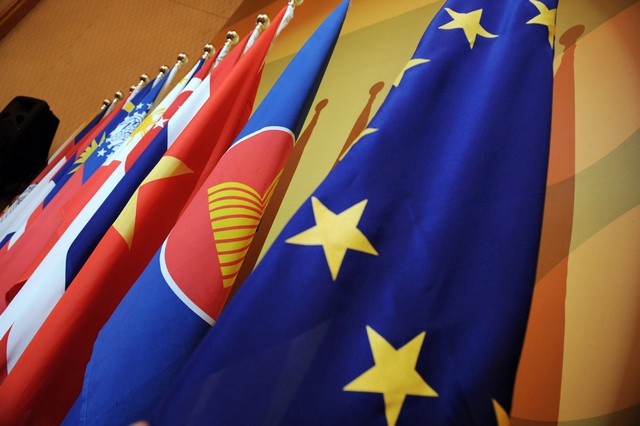Parliamentarians from Europe and fellow ASEAN nations were the latest to weigh in this week on the unfolding crisis in Arakan State, with a resolution in Brussels voicing concern over reports of human rights abuses and a group of regional lawmakers looking ahead to a 19 December meeting of foreign ministers to discuss the situation.
“MEPs [members of the European Parliament] are extremely concerned about reports of violent clashes with the Rohingya people in the state of Rakhine [Arakan] in Myanmar and deplore the loss of life, livelihood and shelter, as well as the reported ‘disproportionate use of force’ by the Myanmar armed forces,” read a statement from the European Parliament on Thursday.
“They urge the military and security forces to put an immediate stop to the killing, harassment and rape of the Rohingya people and to stop burning down their homes, while pointing out the duty of the Myanmar authorities to investigate the attacks.”
The Burma Army and government officials have offered blanket rejections of alleged misconduct by security forces in Arakan State in the wake of a deadly 9 October attack on border guard posts in the state’s north. The subsequent crackdown in search of the suspected militants has targeted Muslims, with the government previously saying Islamic extremism motivated the assault.
Access to northern Arakan State has been severely curtailed, making claims of abuses and government denials difficult to corroborate.
The blockade in the state’s north has also had implications for more than 130,000 people who had been receiving food and health assistance until 9 October.
On Friday, Pierre Peron of the UN Office for the Coordination of Humanitarian Affairs (OCHA) in Burma told DVB that “very little has changed in terms of humanitarian access in Maungdaw in Rakhine State.”
He added that a statement on Tuesday from OCHA remained reflective of the situation on the ground as of Friday. That statement read, “Most of the pre-existing humanitarian activities in the northern part of Rakhine State remain suspended as a result of movement restrictions put in place after 9 October 2016.”
ASEAN Parliamentarians for Human Rights (APHR), meanwhile, welcomed State Counsellor Aung San Suu Kyi’s decision to call an informal meeting of the regional bloc’s foreign ministers next Monday in Naypyidaw to discuss the situation in Arakan State.
“This meeting reflects a recognition that the ongoing Rohingya crisis is, indeed, a regional concern,” said APHR chairperson Charles Santiago, a Malaysian lawmaker, in a statement on Friday. “But the meeting should not be treated as a form of political cover for the Myanmar government. ASEAN foreign ministers should use the opportunity to address the crisis head-on. They must impress upon Ms. Aung San Suu Kyi the importance of protecting civilian life and ensuring that abuses are properly and urgently investigated.”
A government-appointed investigation commission was announced on 1 December, charged with probing the cause of the 9 October attacks and ensuing security crackdown, but APHR questioned the independence of the body, which is chaired by retired lieutenant general Myint Swe, and called for a separate inquiry involving other ASEAN member states.
“The Myanmar government and military must immediately allow for such an investigation, which should include outside observers and empower investigators to visit all affected areas and interview victims,” Santiago said.
“The investigation should also include NGOs from within ASEAN, as well as individuals who are familiar with torture issues. If violence is proven, compensation must be provided and security forces involved must be brought to justice.”
Monday’s meeting will not be the first time ASEAN nations have been brought together to address a Rohingya-related crisis: In late May 2015, delegates from the 10 member states met in Bangkok to discuss a growing humanitarian disaster as asylum-seeking Bangladeshis and Rohingya refugees began washing up on the shores of other Southeast Asian countries by the thousands.
A regional crackdown on human trafficking in the preceding weeks had caused many traffickers to abandon their passengers at sea, and as the number of “boatpeople” making landfall began to swell, some countries’ navies began pushing the vessels outside of their maritime boundaries.
At one point, it is believed that as many as 2,000 people were left adrift.
Participants at the summit agreed on several points, including efforts to identify the “root causes” of the 2015 crisis.
“Addressing factors in the areas of origin including, among others … enhancing a sense of security and belonging, promoting full respect for human rights and adequate access of people to basic rights and services such as housing, education and healthcare,” read the agreement.
[related]
One open question hanging over the meeting of ASEAN foreign ministers next week is to what extent attendees will use the term “Rohingya.” Suu Kyi’s government, like its predecessor, has avoided using the term, and the May 2015 statement pointedly referred only to “irregular migrants.”
The former government’s envoy, Htein Lin, assumed a defensive posture early on during last year’s meeting, admonishing other countries’ delegations for “singling out” Burma as responsible for the boat crisis.



